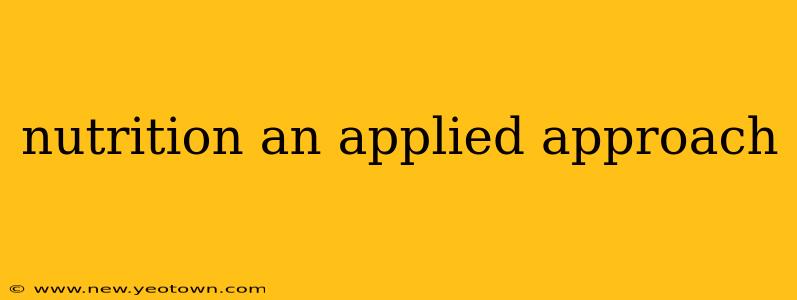Have you ever felt overwhelmed by the sheer volume of nutrition information out there? One day, saturated fat is the enemy; the next, it's all about healthy fats. The truth is, navigating the world of nutrition can feel like navigating a dense jungle. But what if I told you there's a way to cut through the confusion and build a truly personalized approach to fueling your body? This isn't about restrictive diets or fleeting trends; it's about understanding the fundamental principles of nutrition and applying them to your unique life.
This journey begins with a simple understanding: nutrition isn't a one-size-fits-all solution. It's a deeply personal science, influenced by your genetics, lifestyle, activity levels, and even your cultural background. Let's explore how to approach nutrition effectively, turning knowledge into tangible results.
What are the basic principles of nutrition?
The cornerstone of a healthy nutritional approach lies in understanding the macronutrients: carbohydrates, proteins, and fats. Each plays a vital role in providing energy, building and repairing tissues, and supporting overall bodily functions. Carbohydrates are your body's primary energy source, while proteins build and repair tissues, and fats are crucial for hormone production and nutrient absorption. Finding the right balance is key, and this balance will differ from person to person.
What is a balanced diet?
A balanced diet isn't about strict portion control or eliminating entire food groups. It's about consuming a variety of nutrient-rich foods from all food groups. Think colorful fruits and vegetables brimming with vitamins and antioxidants, lean proteins to support muscle growth and repair, whole grains for sustained energy, and healthy fats like avocados and nuts for brain function and hormone regulation. The goal is to create a diverse plate, ensuring your body receives a wide spectrum of nutrients it needs to thrive.
How many calories should I eat a day?
This is a question that often sparks confusion. The ideal calorie intake varies significantly depending on factors like age, gender, activity level, and body composition. There's no magic number. Instead of focusing on a specific calorie count, prioritize consuming nutrient-dense foods and engaging in regular physical activity. Your body will naturally regulate its energy needs based on your lifestyle.
What are some common nutrition myths?
The internet is a breeding ground for nutrition myths, often fueled by misinformation and anecdotal evidence. For example, the idea that all fats are bad is simply untrue. Healthy fats are essential for numerous bodily functions. Similarly, the notion that skipping meals boosts metabolism is a fallacy. Regular, balanced meals help maintain stable blood sugar levels and prevent overeating later in the day. Always rely on credible sources and consult with registered dietitians or healthcare professionals for personalized advice.
How can I make sustainable dietary changes?
Sustainable changes are built on small, incremental steps rather than drastic overhauls. Start by incorporating one or two healthy habits into your routine. Perhaps it's adding more vegetables to your meals, choosing whole grains over refined carbohydrates, or swapping sugary drinks for water. Small, consistent changes are far more effective than drastic measures that often lead to burnout and relapse.
What is the role of micronutrients in nutrition?
Micronutrients, such as vitamins and minerals, are vital for various bodily processes. They act as catalysts for many biochemical reactions, contributing to energy production, immune function, and overall well-being. A balanced diet that encompasses a variety of fruits, vegetables, and whole grains generally provides sufficient micronutrients. However, individual needs may vary, and supplementation should be considered only after consulting with a healthcare professional.
By understanding the fundamental principles of nutrition and embracing a personalized, applied approach, you can embark on a journey to better health and well-being. It's not about perfection but about consistent effort, informed choices, and a commitment to fueling your body with the nourishment it deserves. Remember, a healthy relationship with food is a lifelong journey, not a race.

